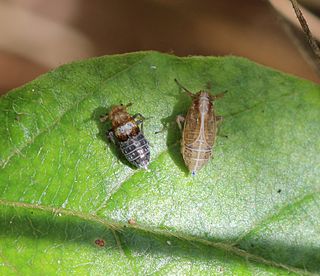
Delphacidae is a family of planthoppers containing about 2000 species, distributed worldwide. Delphacids are separated from other "hoppers" by the prominent spur on the tibia of the hindleg.

Delphacinae is a subfamily of delphacid planthoppers in the family Delphacidae. There are at least 1,700 described species in Delphacinae.

Megamelus is a genus of delphacid planthoppers in the family Delphacidae. There are at least 30 described species in Megamelus.

Nothodelphax is a genus of delphacid planthoppers in the family Delphacidae. There are more than 20 described species in Nothodelphax.
Pareuidella is a genus of delphacid planthoppers in the family Delphacidae. There are about five described species in Pareuidella.
Phrictopyga is a genus of delphacid planthoppers in the family Delphacidae. There are about 12 described species in Phrictopyga.

Sogatella is a genus of delphacid planthoppers in the family Delphacidae. There are more than 20 described species in Sogatella.
Pygospina is a genus of delphacid planthoppers in the family Delphacidae. There are about five described species in Pygospina.

Stenocranus is a genus of delphacid planthoppers in the family Delphacidae. There are more than 70 described species in Stenocranus.
Phyllodinus is a genus of delphacid planthoppers in the family Delphacidae. There are about six described species in Phyllodinus.
Prokelisia is a genus of delphacid planthoppers in the family Delphacidae. There are about five described species in Prokelisia.
Toya is a genus of delphacid planthoppers in the family Delphacidae. There are at least 40 described species in Toya.
Paraliburnia is a genus of delphacid planthoppers in the family Delphacidae. There are about seven described species in Paraliburnia.

Criomorphus is a genus of delphacid planthoppers in the family Delphacidae. There are about 13 described species in Criomorphus.
Syndelphax is a genus of delphacid planthoppers in the family Delphacidae. There are about 19 described species in Syndelphax.
Laccocera is a genus of delphacid planthoppers in the family Delphacidae. There are about 10 described species in Laccocera.
Perkinsiella is a genus of delphacid planthoppers in the family Delphacidae. There are more than 30 described species in Perkinsiella.

Muirodelphax is a genus of delphacid planthoppers in the family Delphacidae. There are about 13 described species in Muirodelphax.
Bostaera is a genus of delphacid planthoppers in the family Delphacidae. There are about five described species in Bostaera.

Muellerianella is a genus of delphacid planthoppers in the family Delphacidae. There are about seven described species in Muellerianella.









